 MyDogBreeds
MyDogBreeds Norwegian Buhund is originated from Norway but Bordoodle is originated from United States. Norwegian Buhund may grow 8 cm / 3 inches shorter than Bordoodle. Norwegian Buhund may weigh 9 kg / 19 pounds lesser than Bordoodle. Both Norwegian Buhund and Bordoodle has same life span. Both Norwegian Buhund and Bordoodle has almost same litter size. Norwegian Buhund requires Moderate maintenance. But Bordoodle requires Low maintenance
Norwegian Buhund is originated from Norway but Bordoodle is originated from United States. Norwegian Buhund may grow 8 cm / 3 inches shorter than Bordoodle. Norwegian Buhund may weigh 9 kg / 19 pounds lesser than Bordoodle. Both Norwegian Buhund and Bordoodle has same life span. Both Norwegian Buhund and Bordoodle has almost same litter size. Norwegian Buhund requires Moderate maintenance. But Bordoodle requires Low maintenance
 The Norwegian Buhund is a spitz type dog belonging to the herding group of dogs. The dog is related to the Icelandic Sheepdog and the Jämthund.
The Norwegian Buhund is a spitz type dog belonging to the herding group of dogs. The dog is related to the Icelandic Sheepdog and the Jämthund.
This dog breed dates back thousands of years to Nordic Viking times. For centuries these dogs have served working dogs, being herders as well as guardians of flock. Even today in remote parts of Norway, you’ll still find this dog doing farm work.
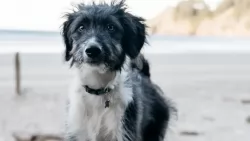 Known also as a Borderpoo or Borderdoodle, the Bordoodle is a designer- or hybrid breed which hails from the United States of America.
Known also as a Borderpoo or Borderdoodle, the Bordoodle is a designer- or hybrid breed which hails from the United States of America.
Both the dogs used in the development of this cross-breed are the Poodle and the Border Collie, and both these dog breeds have their own lengthy histories.
The history of the Bordoodle is short, as it is a modern crossbreed which has been purposefully bred by breeders to bring about a dog with certain looks and temperament.
 The Norwegian Buhund stands at 41 to 47cm in height both male and female. He is a medium sized dog and weighs between 12 and 18kg.
The Norwegian Buhund stands at 41 to 47cm in height both male and female. He is a medium sized dog and weighs between 12 and 18kg.
Known as a herding dog, he is described as being deep chested with a well built, compact body, erect ears and a tail which curves over the back. The head of the dog is wedge-shaped and he has a bright, intelligent look to him.
The coat is essentially a wheaten color but it can be other shades such as a pale cream color to bright orange and sometimes even black. The coat is short to medium in length and he sheds moderately with some seasonal shedding as well.
Fun loving, friendly and social, the Norwegian Buhund is also an active dog who will always be pleading with you for a game or walkies. His pleading brown eyes will hopefully soften your heart towards him so that you give him a ball game or a run in the park. It is why this dog breed gets on well with children – he loves to be playing games with them.
They are such lovable dogs, wanting to spend time with their human family and always ready with a doggy kiss. They want to protect the ones they love and this makes them good watchdogs too, being wary around strangers. He is highly intelligent and will go through training and socialization with ease.
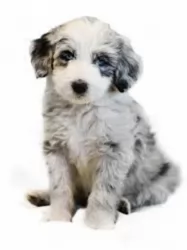 The Bordoodle isn’t a purebred dog but is a cross between a Poodle and a Border Collie.
The Bordoodle isn’t a purebred dog but is a cross between a Poodle and a Border Collie.
He has a soft, medium length coat which is inclined to be wavy. Colors are essentially black and white but chocolate, cream, fawn, merle and grey are also seen.
He is a medium sized dog standing at between 38cm and 55cm and weighing between 13kg and 27kg. The long tail is feathery, the ears floppy or semi-erect and the brown eyes are bright and intelligent. The muzzle is medium to long.
As with any mixed breed dog, the Bordoodle can take after either parent dog but generally the Borderdoodle will be a medium sized dog.
With the Bordoodle you can expect nothing less than a highly intelligent dog. That is because both the Poodle and the Border Collie are super intelligent dogs so the Bordoodle is guaranteed to have got a good portion of this intelligence from both breeds.
It makes training and socialization easy for the dog. It is important for your Bordoodle to be trained and socialized if you want him to be obedient and relaxed around strangers and other pets. As it is, his amicable nature makes the hybrid dog of yours a great family pet – getting on well with other pets in the home as well as with children.
Apart from being such a smart dog, the Bordoodle is active, playful, loving and devoted – everything a serious dog owner wants in a pet. This is a dog that doesn’t really know the meaning of the word aggressive.
 He will need exercise on a daily basis. They are lovable dogs and are affectionate towards children in the home. They form strong bonds with their human family.
He will need exercise on a daily basis. They are lovable dogs and are affectionate towards children in the home. They form strong bonds with their human family.
He is a strong willed dog, and will require training and socialization. As a working and herding dog, he wants to be busy, and is perhaps best suited to life in the suburbs or countryside as opposed to living in the city.
He makes an awesome companion dog and he wants to please his human family and be an active part of their lives.
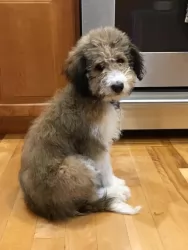 Bordoodles have two great dog breeds to thank for the way they turn out. When you think of the Border Collie and Poodle, you know you’re going to get a dog that is friendly, social, playful, loving and devoted – the ideal family pet.
Bordoodles have two great dog breeds to thank for the way they turn out. When you think of the Border Collie and Poodle, you know you’re going to get a dog that is friendly, social, playful, loving and devoted – the ideal family pet.
Intelligent, he is easy to train too, and with excellent care, you’re going to have a most wonderful family pet and companion, full of fun and life.
 Provide your Norwegian Buhund with the right care and he can get to 15 years of age. Hip dysplasia is always an issue with dogs and you should be very wary of it as it can cause lameness and pain.
Provide your Norwegian Buhund with the right care and he can get to 15 years of age. Hip dysplasia is always an issue with dogs and you should be very wary of it as it can cause lameness and pain.
Cataracts is another illness that you want to be aware of. Although not painful, this eye aliment can lead to blindness.
Look out for other common dog illnesses such as bloat, skin allergies and cancer.
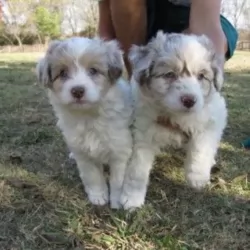 Bordoodles, when well cared for, can live to be 12-15 years of age. There aren’t going to be many health issues to contend with with your Bordoodle as there are no known health problems in this robust breed.
Bordoodles, when well cared for, can live to be 12-15 years of age. There aren’t going to be many health issues to contend with with your Bordoodle as there are no known health problems in this robust breed.
Nonetheless there are some common dog illnesses that you need to be aware of such as progressive retinal atrophy, hip dysplasia and hypothyroidism.
With hypothyroidism, the thyroid gland in the neck of your pet produces a hormone known as thyroxine that controls metabolism, but the disease hypothyroidism makes it that the gland doesn’t make enough thyroxine. Signs that your dog has this illness includes a dull coat, inflamed skin and even hair loss.
Get him to the vet immediately who will do blood tests and provide treatment. Mercifully it isn’t something that is life-threatening.
 You’re going to need to provide this dog of yours with activities that stimulate him physically and mentally. The Norwegian Buhund isn’t a couch-potato type of dog and he doesn’t do well with just lying around. Take him on walks and hikes, throw balls or frisbees for him and buy him some toys that can entertain him. You want to avoid him barking and digging from sheer boredom.
You’re going to need to provide this dog of yours with activities that stimulate him physically and mentally. The Norwegian Buhund isn’t a couch-potato type of dog and he doesn’t do well with just lying around. Take him on walks and hikes, throw balls or frisbees for him and buy him some toys that can entertain him. You want to avoid him barking and digging from sheer boredom.
Like all other spitz-breed dogs, the Norwegian Buhund has a thick double coat, and because he sheds moderately, you will need to brush him at least twice a week. Check simultaneously for ticks and fleas.
Check your pets eye and ears for infection and check his teeth. A rotting tooth at the back of his mouth can be the cause of a lot of pain and problems throughout the body. Keep his nails clipped as well so as to prevent them hooking onto things.
Provide your pet with a nice warm, dry, comfortable place to sleep. If he goes outside, make sure he has a place to lie in the shade or in the sun.
Take your pet to the vet when he appears to be lethargic and sick. Remember to keep his vaccines up to date.
Feed your pet food which is known for its nutritional value. Home made food is a real treat for your pet, but high quality commercially manufactured food can be good and convenient too.
Dogs love simple, consistent diets which don’t upset their stomachs. Boiled chicken, brown rice or pasta, and some vegetables such as sweet potatoes, spinach and carrots chopped up into his food from time to time can be superbly nutritious for your pet. Try and also include a little bit of raw meat occasionally. Always have a bowl of fresh, cool water available to your pet.
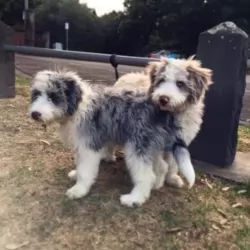 The Bordoodle is a dog which doesn’t shed that much so his grooming requirements are low and he is considered as a hypoallergenic dog.
The Bordoodle is a dog which doesn’t shed that much so his grooming requirements are low and he is considered as a hypoallergenic dog.
He will need to have his coat brushed at least twice a week to keep it shiny, soft and smooth. Depending on how your Bordoodle turns out, he may even require trimming at a professional groomer.
Make time to check his ears inside and out and learn how to clean the inside of his ears to avoid infection and wax build-up.
Dental hygiene is also imperative in dogs, and neglecting to do this will mean food particles and bacteria accumulating along your pet’s gumline, resulting in gingivitis and periodontal disease.
Every dog will require regular exercise and you can get your Bordoodle to join you in your walks. He is the kind of dog that can happily adjust to city or country life, but he will still need to have some ball games and other activities to keep him busy and happy.
He isn’t a dog that can be left alone day after day in the backyard. He is social and playful and loves the companionship of his human family.
If you feed your Bordoodle kibble from some of the top quality commercially produced foods, always research the dog food and take a good look at the ingredients.
The pet food you choose plays an important role in the longevity of your pet. There are commercially manufactured foods that have such poor ingredients that they can actually shorten your pet’s lifespan and cause stress to the kidneys and liver.
If in any doubt about what to feed your Bordoodle, speak to your vet. Cooked brown rice, cooked vegetables and cooked chicken can sometimes be mixed into your pet’s kibble. Raw meat should also occasionally be added in to ward off skin allergies.